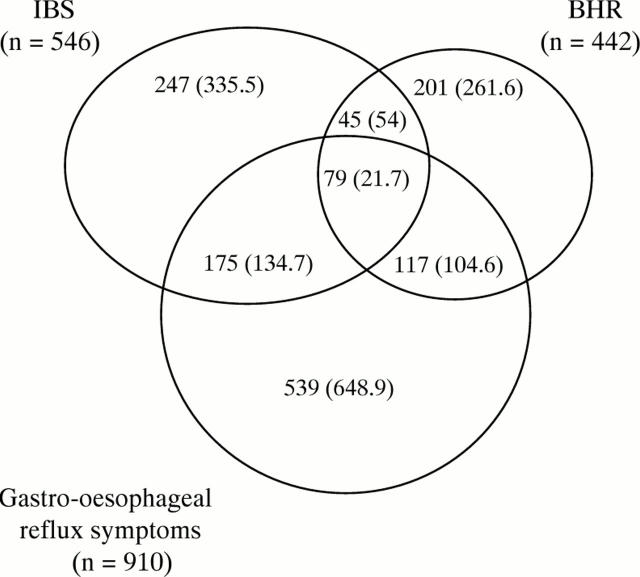Abstract
Background—Associations have been shown between irritable bowel syndrome (IBS) and gastro-oesophageal reflux, between gastro-oesophageal reflux and asthma, and more recently between IBS and bronchial hyper-responsiveness (BHR). Aims—To explore the inter-relations between these conditions. Subjects—A randomly selected community sample of 4432adults. Methods—A validated postal symptom questionnaire investigating the associations between IBS, gastro-oesophageal reflux symptoms, and symptomatic BHR. Results—3169 questionnaires (71.7% response) returned by 1451 men and 1718 women were analysed. One year prevalences, in men and women respectively, of IBS were 10.5% and 22.9%, of dyspepsia 26.3% and 25.25%, of gastro-oesophageal reflux symptoms 29.4% and 28.2%, of BHR 13.2% and 14.6%, and of chronic bronchitis 8.3% and 4.9%. Logistic regression showed independent associations between IBS and BHR, gastro-oesophageal reflux symptoms, and dyspepsia. There was no significant independent association between IBS and chronic bronchitis. In men and women the odds ratio with 95% confidence interval (CI) for IBS and gastro-oesophageal reflux symptoms was 2.6 (2.1-3.1; p<0.001) and for IBS and BHR 2.1 (1.7-2.7; p<0.001). These associations held on stratifying for sex and consultation behaviour. IBS, gastro-oesophageal reflux symptoms, and bronchial hyper-responsiveness occurred more frequently together than expected, 2.5% (95% CI 2.41-2.57) of the sample having all three conditions compared with an expected prevalence of 0.7% (95% CI 0.66-0.71). The conditions were independently associated with each other. Conclusions—These observations may indicate the presence of an underlying disorder producing symptoms in gastrointestinal and respiratory systems.
Keywords: irritable bowel syndrome; asthma; dyspepsia; gastro-oesophageal reflux; epidemiology
Full Text
The Full Text of this article is available as a PDF (105.1 KB).
Figure 1 .
Observed prevalences and (expected prevalences).
Selected References
These references are in PubMed. This may not be the complete list of references from this article.
- Boyle J. T., Tuchman D. N., Altschuler S. M., Nixon T. E., Pack A. I., Cohen S. Mechanisms for the association of gastroesophageal reflux and bronchospasm. Am Rev Respir Dis. 1985 May;131(5):S16–S20. doi: 10.1164/arrd.1985.131.S5.S16. [DOI] [PubMed] [Google Scholar]
- Burney P. G., Britton J. R., Chinn S., Tattersfield A. E., Papacosta A. O., Kelson M. C., Anderson F., Corfield D. R. Descriptive epidemiology of bronchial reactivity in an adult population: results from a community study. Thorax. 1987 Jan;42(1):38–44. doi: 10.1136/thx.42.1.38. [DOI] [PMC free article] [PubMed] [Google Scholar]
- Burney P. G., Chinn S., Britton J. R., Tattersfield A. E., Papacosta A. O. What symptoms predict the bronchial response to histamine? Evaluation in a community survey of the bronchial symptoms questionnaire (1984) of the International Union Against Tuberculosis and Lung Disease. Int J Epidemiol. 1989 Mar;18(1):165–173. doi: 10.1093/ije/18.1.165. [DOI] [PubMed] [Google Scholar]
- Burney P., Chinn S. Developing a new questionnaire for measuring the prevalence and distribution of asthma. Chest. 1987 Jun;91(6 Suppl):79S–83S. doi: 10.1378/chest.91.6_supplement.79s. [DOI] [PubMed] [Google Scholar]
- Collins S. M. Is the irritable gut an inflamed gut? Scand J Gastroenterol Suppl. 1992;192:102–105. doi: 10.3109/00365529209095988. [DOI] [PubMed] [Google Scholar]
- Fleming D. M. Morbidity registration and the fourth general practice morbidity survey in England and Wales. Scand J Prim Health Care Suppl. 1993;2:37–41. doi: 10.3109/02813439309045500. [DOI] [PubMed] [Google Scholar]
- Fletcher C. M., Peto R., Tinker C. M. A comparison of the assessment of simple bronchitis (chronic mucus hypersecretion) by measurements of sputum volume and by standardized questions on phlegm production. Int J Epidemiol. 1974 Dec;3(4):315–319. doi: 10.1093/ije/3.4.315. [DOI] [PubMed] [Google Scholar]
- Jones R. H., Lydeard S. E., Hobbs F. D., Kenkre J. E., Williams E. I., Jones S. J., Repper J. A., Caldow J. L., Dunwoodie W. M., Bottomley J. M. Dyspepsia in England and Scotland. Gut. 1990 Apr;31(4):401–405. doi: 10.1136/gut.31.4.401. [DOI] [PMC free article] [PubMed] [Google Scholar]
- Jones R., Lydeard S. Irritable bowel syndrome in the general population. BMJ. 1992 Jan 11;304(6819):87–90. doi: 10.1136/bmj.304.6819.87. [DOI] [PMC free article] [PubMed] [Google Scholar]
- Jones R., Lydeard S. Prevalence of symptoms of dyspepsia in the community. BMJ. 1989 Jan 7;298(6665):30–32. doi: 10.1136/bmj.298.6665.30. [DOI] [PMC free article] [PubMed] [Google Scholar]
- Kennedy T., Jones R. Development of a postal health status questionnaire to identify people with dyspepsia in the general population. Scand J Prim Health Care. 1995 Dec;13(4):243–249. doi: 10.3109/02813439508996770. [DOI] [PubMed] [Google Scholar]
- Kettell J., Jones R., Lydeard S. Reasons for consultation in irritable bowel syndrome: symptoms and patient characteristics. Br J Gen Pract. 1992 Nov;42(364):459–461. [PMC free article] [PubMed] [Google Scholar]
- Klauser A. G., Schindlbeck N. E., Müller-Lissner S. A. Symptoms in gastro-oesophageal reflux disease. Lancet. 1990 Jan 27;335(8683):205–208. doi: 10.1016/0140-6736(90)90287-f. [DOI] [PubMed] [Google Scholar]
- Manning A. P., Thompson W. G., Heaton K. W., Morris A. F. Towards positive diagnosis of the irritable bowel. Br Med J. 1978 Sep 2;2(6138):653–654. doi: 10.1136/bmj.2.6138.653. [DOI] [PMC free article] [PubMed] [Google Scholar]
- Mansfield L. E., Stein M. R. Gastroesophageal reflux and asthma: a possible reflex mechanism. Ann Allergy. 1978 Oct;41(4):224–226. [PubMed] [Google Scholar]
- Mays E. E. Intrinsic asthma in adults. Association with gastroesophageal reflux. JAMA. 1976 Dec 6;236(23):2626–2628. [PubMed] [Google Scholar]
- Schindlbeck N. E., Ippisch H., Klauser A. G., Müller-Lissner S. A. Which pH threshold is best in esophageal pH monitoring? Am J Gastroenterol. 1991 Sep;86(9):1138–1141. [PubMed] [Google Scholar]
- Talley N. J., Weaver A. L., Tesmer D. L., Zinsmeister A. R. Lack of discriminant value of dyspepsia subgroups in patients referred for upper endoscopy. Gastroenterology. 1993 Nov;105(5):1378–1386. doi: 10.1016/0016-5085(93)90142-y. [DOI] [PubMed] [Google Scholar]
- Toelle B. G., Peat J. K., Salome C. M., Mellis C. M., Woolcock A. J. Toward a definition of asthma for epidemiology. Am Rev Respir Dis. 1992 Sep;146(3):633–637. doi: 10.1164/ajrccm/146.3.633. [DOI] [PubMed] [Google Scholar]
- White A. M., Stevens W. H., Upton A. R., O'Byrne P. M., Collins S. M. Airway responsiveness to inhaled methacholine in patients with irritable bowel syndrome. Gastroenterology. 1991 Jan;100(1):68–74. doi: 10.1016/0016-5085(91)90584-8. [DOI] [PubMed] [Google Scholar]
- Whitehead W. E., Winget C., Fedoravicius A. S., Wooley S., Blackwell B. Learned illness behavior in patients with irritable bowel syndrome and peptic ulcer. Dig Dis Sci. 1982 Mar;27(3):202–208. doi: 10.1007/BF01296915. [DOI] [PubMed] [Google Scholar]



